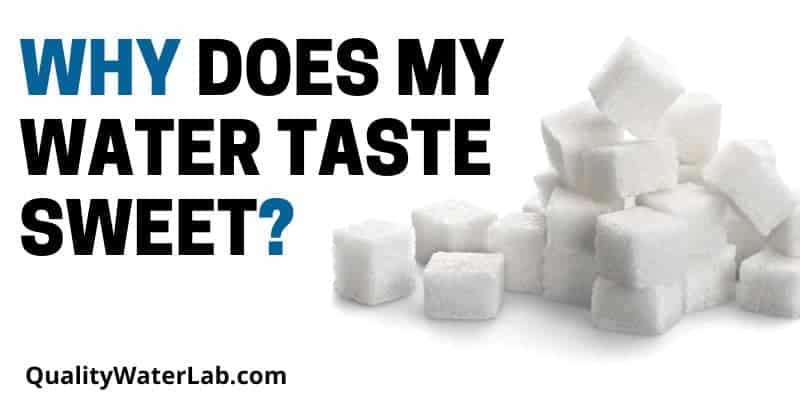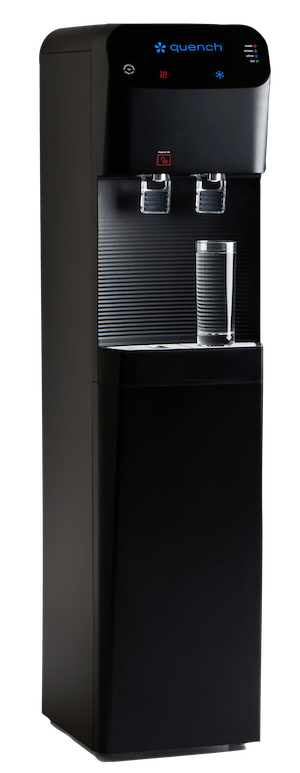Not all glasses of H₂O are created equal. Sometimes it may taste metallic, or it may smell like chlorine. But what if your water has a sweet aftertaste? This could mean that it has a lot of naturally occurring minerals in it or that the alkaline (pH) levels are off. No matter what, you need to find the source of the problem and fix it so you can enjoy clean, fresh water.
Have you noticed your tap water has started tasting sweet? That sugary flavor might seem harmless but it could point to bigger issues with your water quality.
Sweet-tasting water doesn’t always mean there’s sugar in your pipes. The causes can range from mineral deposits to contamination and each one requires different solutions.
Here are 7 potential reasons your water tastes sweet and what to do about them:
1. Calcium and Magnesium
Hard water contains higher levels of calcium and magnesium. These dissolved mineral deposits can give your water a sweet, salty or even bitter taste.
Hard water isn’t dangerous on its own. However, it can cause other problems like mineral buildup, corrosion, and damage to appliances over time. The sweet flavor is your first sign that water softening could be needed.
A water softener removes the calcium and magnesium ions that cause hardness. This will get rid of that sweetness and prevent related issues like scale buildup on fixtures.
2. Iron
Like calcium and magnesium, iron is a mineral that can seep into water supplies. Iron by itself has a metallic taste, but when combined with hardness minerals, it can create a sweet flavor.
Too much iron can cause orange/reddish stains on sinks and laundry. It can also support bacteria growth and clog pipes and appliances.
Installing an iron water filter is the solution here. It will remove both soluble and insoluble iron, getting rid of the sweet taste and preventing stains or buildup.
3. Copper
Corroded copper pipes can leach copper ions into tap water. In large amounts, copper makes water taste bitter and metallic. But small amounts have a sweet, sugary flavor.
If copper levels are high enough, it can cause nausea, vomiting and other health issues. Always get your water tested for copper if it tastes sweet.
Replacing old copper plumbing is the ultimate fix. In the meantime, a reverse osmosis system will remove copper along with other contaminants that may be causing sweetness.
4. Chlorine
Municipal water systems use chlorine as a disinfectant. While it kills germs, some find its taste and smell unpleasant. Those sensitive to chlorine say it makes water taste slightly sweet or like a swimming pool.
The good news is chlorine at regulated levels is safe to ingest. The taste just means it’s doing its job of sanitizing your water supply. A carbon filter reduces chlorine levels for better flavor.
5. Bacteria and Biofilms
Slow-flowing water encourages bacteria growth, particularly in aging pipes and tanks. These microbes produce biofilm slime layers that can release sweet-tasting compounds into the water.
Bacteria also feed on organic matter, creating byproducts that affect taste and odor. Their presence usually means there are larger issues with your plumbing or water source. Professional disinfection is required to remove biofilm and kill bacteria.
6. Algal Blooms
Source water contaminated by blue-green algae can make tap water smell and taste sweet. Algal blooms thrive in warm, slow-moving surface water that gets a lot of sun.
While not all algae is toxic, some species release dangerous cyanotoxins. Consuming affected water can cause nausea, liver damage and neurological effects. You’ll need professional testing and treatment if an algal bloom is suspected.
7. Cross-Contamination
Chemical contamination like antifreeze or fuel leaks can make water taste sweet. But this is rare unless you’re on well water near an industrial site or agricultural land. Municipal supplies are closely monitored for toxins.
Still, weird tastes warrant further testing. A lab analysis can identify if organic compounds are present. Activated carbon filters excel at removing volatile organics that could be causing sweetness.
Solve Sweet Water Problems
Start by having your water professionally tested to pinpoint the exact cause. From there, a water treatment professional can recommend the right filtration, softening or disinfection solutions to correct the issues causing sweetness.
With the proper system in place, you’ll once again have fresh, clean-tasting water flowing from every tap. No more unpleasant flavors interfering with your drinking water or bathing routine.

Get A Free EstimateFill out this form or call

What Causes the Taste?
There are several reasons why your water might taste sweet, and not all of them are bad. The quality and amount of trace minerals in your water, like a higher calcium count, can change its taste, from sweet to sour, depending on where it comes from.
If minerals aren’t causing the issue, then another sweet-toothed culprit could be your plumbing. Whether your office or home is new or old, the pipes can change how salty or sweet the water tastes. Letting the water run for longer periods of time (this is called “clearing” the pipes) before you drink may also change the taste.
Additional causes of water tasting sweet may be attributed to something you’ve recently eaten. Typically, when you eat something sour, your saliva produces chemicals that trigger a sweet-tasting sensation. And since water is neutral, if you take a drink after eating something sour, it will naturally pick up on that newfound sweet flavor. However, sometimes the sweet taste of water is not actually something you taste at all—it’s something you smell. Your body can often confuse the senses of taste and smell and your water issue may actually be attributed to a smell.
Why Does Water Taste Sweet Sometimes?
FAQ
What does it mean if my water tastes sweet?
Why is the water I’m drinking sweet?
Does diabetes make water taste sweet?
Why does my water taste like it has sugar in it?
What causes sweet-tasting water?
You have a hormone imbalance. Hormone imbalances can cause a range of physical reactions, from fatigue and weight gain to sweet-tasting water. When our hormones are out of balance, different tastes can be distorted. This cause of sweet-tasting water is most common in people with high estrogen levels and people who are pregnant.
Why am I wanting sweets all of a sudden?
Many factors, including emotional needs, can cause sugar cravings. Emotional needs that the body believes necessitate dopamine, as well as sweet foods, can most likely relieve negative emotions and make you happy. Hypoglycemia can also be one of the reasons why the body needs sugar to raise blood glucose levels.
Why does my water taste sweet?
Sometimes minerals can improve the quality of water, other times they can make the water taste salty, metallic, or sweet. A pH imbalance in water can alter the taste of water. A high pH — making the water acidic — can make the water taste sweet. This is a common problem and it’s the sort of thing you’d solve with a whole-house water filter.
Why is my Neighbor drinking sweet-tasting water?
In case your neighbors even have a problem with sweet-tasting water flowing from their faucets, the issue could come from the general public water supply. So, contact your native water supplier to handle the difficulty. Water high quality points like excessive mineral content material are frequent in case you’re on nicely water.
Why does well water taste sweeter than municipal water?
This explains why well water, which commonly contains higher levels of minerals, usually has a naturally sweeter taste than municipal water. Aside from clogging pipes, staining fixtures, and irritating skin and hair, mineral ions can impart a sweet, almost salty flavor in the water when levels get too high.
Why does water taste sweet after vomiting?
The same phenomenon happens after vomiting. One of the more common underlying conditions to consider is diabetes. Water may taste sweet if your body is trying to regulate your blood sugar levels. A higher sugar level may cause water to taste sweet to you.
